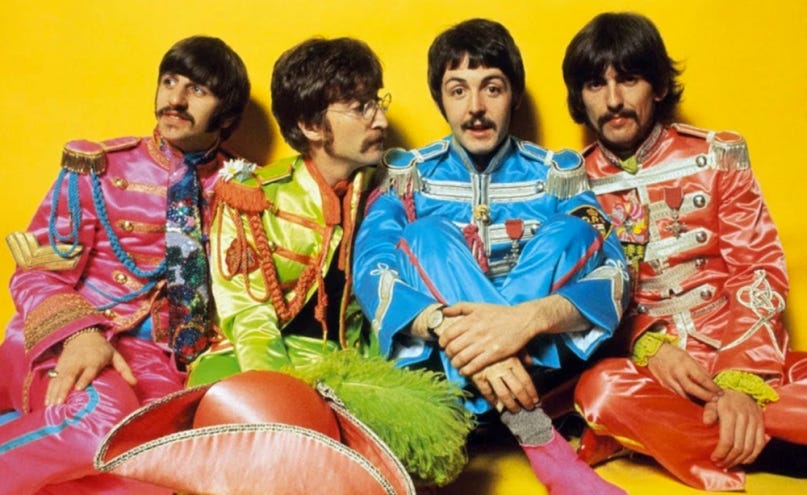Sgt. Pepper's Lonely Hearts Club Band
The release of "Sgt. Pepper's Lonely Hearts Club Band" by The Beatles in 1967 stands as a watershed moment in the evolution of hippy culture.
The release of "Sgt. Pepper's Lonely Hearts Club Band" by The Beatles in 1967 stands as a watershed moment in the evolution of hippy culture, music history, and the broader cultural landscape of the 1960s. This album did not just mark a significant artistic leap for The Beatles but also became an emblem of the era's burgeoning counterculture, influencing fashion, attitudes towards drug use, and the philosophy of peace and love that were central to hippy ideology.
Artistic Innovation and Musical Influence
"Sgt. Pepper's" was revolutionary in its production techniques, use of unconventional instruments, and complex arrangements, setting a new standard for what could be achieved in the recording studio. Its conceptual unity and the idea of an alter ego band performing the album's songs captivated listeners and inspired musicians to experiment with their own sounds and thematic albums. This spirit of experimentation was in harmony with the hippy movement's emphasis on exploration and breaking free from societal norms.
Listen To The Album
Fashion and Visual Aesthetics
The album's cover, featuring The Beatles in vivid, psychedelic uniforms amidst a collage of historical and contemporary figures, became an iconic image of the era. It influenced the fashion sensibilities of the hippy movement, encouraging a break from conservative dress norms and the embrace of colorful, flamboyant clothing that expressed individuality and a departure from mainstream culture. The visual aesthetic of "Sgt. Pepper's" contributed to the popularization of psychedelic art, which sought to replicate the altered states of consciousness associated with psychedelic drug experiences.
Drug Culture and Psychedelic Experience
"Sgt. Pepper's" is often cited as the soundtrack of the "Summer of Love," a period which saw an explosion of hippy culture in San Francisco and beyond. The album's lyrical content and sonic landscapes were interpreted as evocations of psychedelic experiences, aligning with the hippies' exploration of consciousness through drugs like LSD. Songs like "Lucy in the Sky with Diamonds" (often interpreted, despite the band's denials, as a reference to LSD) and "A Day in the Life" provided a musical expression of the psychedelic experience, further entwining The Beatles with the drug culture of the time.
Philosophy of Peace and Love
The Beatles' transformation from pop stars to cultural leaders with the release of "Sgt. Pepper's" played a significant role in spreading the hippy movement's core philosophies of peace, love, and communal living. The album's message of togetherness and understanding resonated with the movement's ideals and was seen as a call to action for those seeking to change the world through non-violent means. It emphasized the power of music as a unifying force, a concept that was central to the hippy movement's gatherings and festivals.
Global Cultural Impact
The impact of "Sgt. Pepper's Lonely Hearts Club Band" extended beyond the confines of the hippy movement and the borders of the United States and the United Kingdom. It represented a global shift towards more liberal social values, questioning of authority, and the pursuit of a more meaningful, spiritually fulfilled life. The album's success and cultural impact facilitated the spread of hippy ideals worldwide, influencing fashion, music, art, and social movements across the globe.
In conclusion, "Sgt. Pepper's Lonely Hearts Club Band" was more than just an album; it was a cultural phenomenon that encapsulated the ethos of an era. Its release marked a pivotal moment in the history of the 1960s, deeply influencing hippy culture and contributing to the broader countercultural movement that sought to challenge and redefine the values of society. Through its innovative sound, visual artistry, and thematic depth, "Sgt. Pepper's" left an indelible mark on the world, symbolizing the hopes, dreams, and aspirations of a generation yearning for change.
